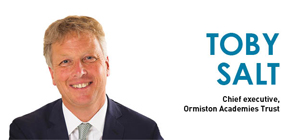Russell Hobby and Professor Toby Salt explore what more the government can do about teacher workload and what practical steps teachers and senior leaders can take to lessen the load.
 Despite good intentions and warm words, teacher workload is not under control. Agencies such as Ofsted do their best to tackle myths about expectations, like marking, yet still the profession is buckling.
Despite good intentions and warm words, teacher workload is not under control. Agencies such as Ofsted do their best to tackle myths about expectations, like marking, yet still the profession is buckling.
We need teachers to work hard at school. But they need to recover and recharge so that they can face an emotionally, intellectually and physically demanding job again the next day. Teachers must be confident their efforts are doing good, rather than jumping through hoops for the sake of some external authority. It is time spent on and for teaching that matters most (which includes planning and professional development).
Teachers must be confident their efforts are doing good, rather than jumping through hoops for the sake of some external authority
There is much that lies in the hands of school leaders. As Toby explains opposite, it is part of their role to clear obstacles for their team so that they can focus on what counts. But school leaders are also trapped by government policy.
It is not that the three workload reports published in the past few months were wrong – they contain many sensible recommendations – but they don’t tackle the root causes of overwork at a policy level: compliance, fear, focus and change.
What are the key drivers of workload?
- The need to comply with external accountability creates work not directly related to teaching. Schools are held accountable for too many things to too many people. A simple, streamlined accountability framework would reduce this burden. It is one thing to have a good knowledge about each student and where he or she is going. It is another to make detailed data reports about performance in an exam system that doesn’t yet exist.
- The burden of complex accountability is amplified by a culture of fear. The stakes are so high that too many schools “gold plate” their procedures to protect against any eventuality. This is accentuated when accountability can be capricious. If you are not sure what someone is looking for, you have to cover every base. The shadow cast by floor standards and interventions is always bigger than the reality. Schools that should have no business worrying about failure, spend too much time thinking about it. The government needs to think carefully not only about the schools they target, but how they can reassure other schools that are not targeted.
- There is a lack of focus in our education system. From gang culture, to teenage pregnancy to swimming lessons and healthy eating – if we can’t figure out what to do about it, we put it on the curriculum. This is exacerbated by the decline of local authority services, with schools having to step in to provide welfare and social care. We simply ask too much of schools.
- Schools can be complicit in this dissipation of focus. It is all too easy to jump on each passing fad. Schools need to fight for a sustained commitment to doing a few things well. Schools leaders should select with a critical if not cynical eye amongst the many external possibilities. The art of strategic procrastination is a key skill of the experienced leader.
- The final challenge is constant change. It unsettles schools, it destroys the value of past work, it creates new work and adds to uncertainty. Managing change absorbs attention that could be devoted to improving practice – Inset days, for example, are increasingly occupied by briefings about new policies rather than true professional development.
It is up to schools to build sensible policies on marking, planning and data. There are not many levers that the government can pull. Instead, the government can create the space for schools to exercise their natural common sense by streamlining their demands, building justified confidence, focusing ruthlessly on what really matters and committing to a period of stability.

Leadership teams should start the new term by ensuring we take what responsibility we can, and make workload as manageable as possible for ourselves and colleagues.
I have worked as a teacher and in school leadership for more than 30 years and there have always been moans about our workload. It impacts on recruitment and retention. Young teachers are voting with their feet, with almost a quarter leaving within the first three years. It matters to me because I know that the academies in our family that serve challenging communities need the best leaders and teachers. We can’t afford for workload to deter great candidates from staying and seeking promotion.
So, some leadership resolutions:
Establish clear lines of delegation and set expectations from the outset. Teachers say that it is not always the quantity of work that frustrates them, but a feeling that some of the work required is overly administrative, rather than something that has a positive impact on learning. It is certainly our role as senior leaders to provide guidance as to what is and what isn’t a priority, and to ensure that precious time is not wasted on the latter. Additionally, in academy trusts, we benefit from being able to delegate responsibilities to the wider leadership team too, not just those with a teaching commitment. So share fairly and delegate well – and do check out Andy Buck’s advice on delegation at honk.org.uk.
Don’t be afraid to be a magpie. There is no harm in mimicking best practice that you have seen elsewhere – schools in multi-academy trusts have the benefit of a breadth of experience and knowledge within their networks. Before you draft a policy, write a risk assessment or develop
a project plan, look to see if a model
already exists within the wider trust that you can draw from. There are also some excellent online sources, such as TheSchoolBus, where you can subscribe to compliant and current policy templates that can be tailored (other products are on the market too!).
Senior leaders must provide guidance as to what is and what isn’t a priority, and ensure that time isn’t wasted
Maximise the potential in IT. As a sector we’re not exploiting IT for data, assessment, marking, communication and management as much as we can. We use IT a lot but the old cliché of data rich, information poor is often the case. IT could save us a lot of time and work, and again we should share what works generously.
Manage accountability. As leaders (and I am so bad at this) let’s only prepare what we really need to. I am not pretending that I don’t worry about Ofsted calling and want to be sure to be ready, but it is worth reminding ourselves of the Ofsted myths and trying not to do more than we should. Like others, I want a reliable, independent, proportionate and supportive accountability system – that’s one area, with the phasing of curriculum and assessment changes, which our new education secretary could help us with.
Timetable not only for the classroom but also for the leadership team. Make sure that reducing the workload for school staff doesn’t tip the scales too far in the other direction and over-burden those carrying the leadership mantle. It is important senior leaders are supported to find time to rest. This means staggered leave across the leadership team and good, on-call rotas that share duties out fairly.
Sian Carr, the Association of School and College Leaders president for 2016-17, highlights that the national education agenda has never been more challenging, something that requires “mature” leadership and able to attract and inspire the next generation of leaders. I agree and making workload manageable is a part of this – there is some good advice for leaders in ASCL’s 10-point plan.
Russell Hobby is General Secretary of NAHT, and Toby Salt is Chief Executive of Ormiston Academies Trust







Your thoughts